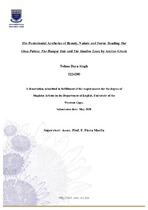The postcolonial aesthetics of beauty, nature and form: Reading the glass palace, the hungry tide and the shadow lines by Amitav Ghosh
Abstract
One can think of an aesthetic as one’s artistic mode and purpose. The aesthetic is differently
foregrounded in each of Ghosh’s three selected novels: in the first novel studied, aesthetic
concerns are linked with beauty. Female beauty in particular, is the primary aesthetic focus in
The Glass Palace since it is beauty that inspires love and appreciation. In the second novel,
The Hungry Tide, the aesthetic explores techniques of writing that encompass environmental
questions. This novel shows nature as its primary aesthetic since it is through the encounter
with nature that its aesthetic is realised and an appreciation for all life forms are established.

